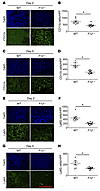Citations to this article
Citation Information: J Clin Invest. 2018;128(3):944-959. https://doi.org/10.1172/JCI92880.
Abstract
Coagulation factor XII (FXII) deficiency is associated with decreased neutrophil migration, but the mechanisms remain uncharacterized. Here, we examine how FXII contributes to the inflammatory response. In 2 models of sterile inflammation, FXII-deficient mice (F12–/–) had fewer neutrophils recruited than WT mice. We discovered that neutrophils produced a pool of FXII that is functionally distinct from hepatic-derived FXII and contributes to neutrophil trafficking at sites of inflammation. FXII signals in neutrophils through urokinase plasminogen activator receptor–mediated (uPAR-mediated) Akt2 phosphorylation at S474 (pAktS474). Downstream of pAkt2S474, FXII stimulation of neutrophils upregulated surface expression of αMβ2 integrin, increased intracellular calcium, and promoted extracellular DNA release. The sum of these activities contributed to neutrophil cell adhesion, migration, and release of neutrophil extracellular traps in a process called NETosis. Decreased neutrophil signaling in F12–/– mice resulted in less inflammation and faster wound healing. Targeting hepatic F12 with siRNA did not affect neutrophil migration, whereas WT BM transplanted into F12–/– hosts was sufficient to correct the neutrophil migration defect in F12–/– mice and restore wound inflammation. Importantly, these activities were a zymogen FXII function and independent of FXIIa and contact activation, highlighting that FXII has a sophisticated role in vivo that has not been previously appreciated.
Authors
Evi X. Stavrou, Chao Fang, Kara L. Bane, Andy T. Long, Clément Naudin, Erdem Kucukal, Agharnan Gandhi, Adina Brett-Morris, Michele M. Mumaw, Sudeh Izadmehr, Alona Merkulova, Cindy C. Reynolds, Omar Alhalabi, Lalitha Nayak, Wen-Mei Yu, Cheng-Kui Qu, Howard J. Meyerson, George R. Dubyak, Umut A. Gurkan, Marvin T. Nieman, Anirban Sen Gupta, Thomas Renné, Alvin H. Schmaier
Loading citation information...




Copyright © 2025 American Society for Clinical Investigation
ISSN: 0021-9738 (print), 1558-8238 (online)

